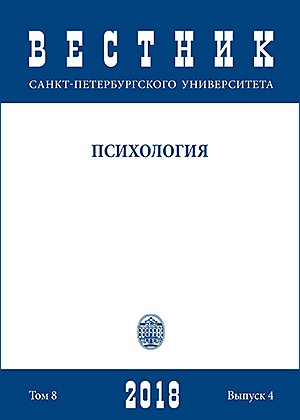On the nature of psychological sovereignty: Relation to the temper
DOI:
https://doi.org/10.21638/11701/spbu16.2018.405Abstract
The psychological sovereignty is an adaptive agency’s feature, contributing to maintaining of subjective well-being in its different aspects and therefore extremely required in everyday life. The empirical study is devoted to the clarification of the nature of psychological sovereignty as a personality trait — to what extent it is set and limited by the psychophysiological characteristics of the individual? The theoretical basis of research is the Theory of psychological sovereignty by S.K.Nartova-Bochaver, the Special theory of individuality by V.M.Rusalov, the Reinforcement sensitivity theory by J.Gray, and the Theory of selfregulation by E.Higgins and A.Kruglyansky. The sample consisted of 260 respondents, mainly students (55 male, Mage=20.7). The following tools were used: “the Sovereignty of psychological space — 2010” questionnaire (Nartova-Bochaver, 2014), the BIS/BAS scales (Carver & White, 1994), the Locomotion and Assessment scales (Kruglyansky et al., 2000), and the Promotion/Prevention Scale (Lockwood, Jordan, & Kunda, 2002). Significant negative connections of sovereignty were found only with the characteristics suppressing behavioural activity; links with the parameters of activation of behaviour were not. Pair regression analysis showed that inhibition and prevention represented anti-predictors of sovereignty; psychophysiological predictors of strengthening the sovereignty were not detected. The results are discussed from the point of view of the Trait theory of personality by G.Allport and Model of Traits as situational sensitivities (TASS) by M.Marshall and J.Braun. The conclusion is made that psychological sovereignty, being a content characteristic of personality, develops in vivo as a result of the person’s experience in resolving potentially depriving situations. The results are discussed in the context of the prospects for the development of sovereignty; the risk group for the development of sovereignty is identified. Nevertheless, the weak regression models revealed ample pedagogical, educational and psychotherapeutic opportunities for stimulating sovereignty.
Keywords:
the psychological sovereignty, temper, inhibition, activation, locomotion, assessment, promotion, prevention
Downloads
References
Downloads
Published
How to Cite
Issue
Section
License
Articles of "Vestnik of Saint Petersburg University. Psychology" are open access distributed under the terms of the License Agreement with Saint Petersburg State University, which permits to the authors unrestricted distribution and self-archiving free of charge.




